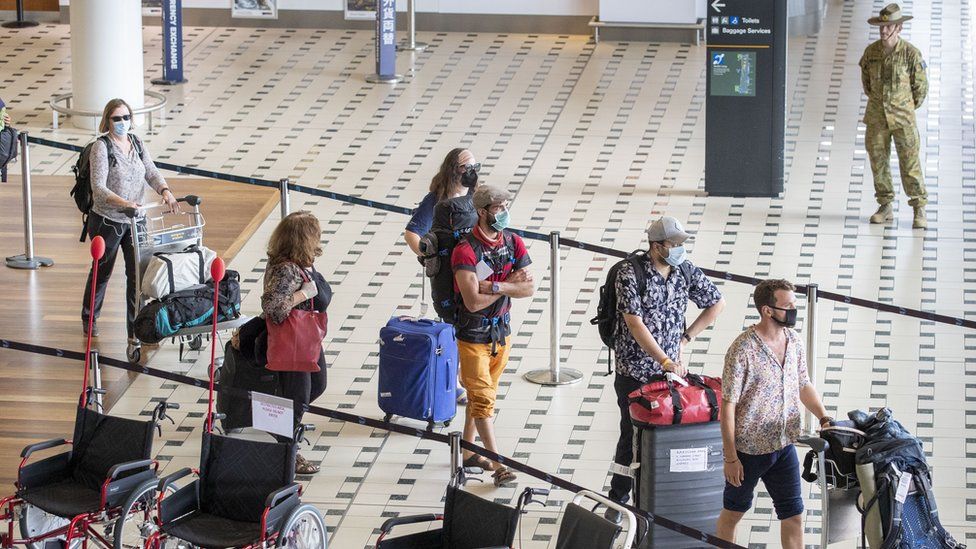
Australia will halve the number of international arrivals it accepts after Covid outbreaks put half the population in lockdown this week.
The country's strict border rules have only allowed Australians and people with exemptions to enter.
From 14 July, Australia will accept just over 3,000 people a week - a measure likely to last until next year.
The announcement has sparked dismay among Australians who are overseas and separated from their families.
But Prime Minister Scott Morrison said the measure would reduce pressure on the country's quarantine system.
Virus leaks from hotel quarantine - which is mandatory for all arrivals - have been the source of numerous outbreaks across the country.
Australia is maintaining a Covid-elimination strategy until it can get the majority of its population vaccinated next year. Just 8% have been vaccinated so far.
"Simply reducing the [travel] caps doesn't necessarily provide a fail safe but because of the particular virulence of the Delta strain, it is believed that is a prudent action while we remain in this suppression phase of the virus," Mr Morrison said.
His government has faced criticism for its border policies over the past year, which have extended family separations and made it difficult for many Australians to return.
In April, the government also temporarily blocked its citizens in India from returning during the height of a deadly wave in the South Asian nation.
About 37,000 Australians remain stranded overseas. On Friday, many online expressed their anger and disappointment over their return trips being cancelled.
"This is utterly heartbreaking and unspeakably stressful," one woman wrote on a Facebook group for stranded Australians.
To mitigate some of the cuts, Mr Morrison said the number of repatriation flights for Australians wanting to fly home would be increased.
Australia will also begin trialling home quarantine arrangements for vaccinated travellers.
Mr Morrison said arrival limits would not be lifted again until most Australians get vaccinated - a goal that will not be achieved until next year due to the country's limited supply of jabs.
What's led to this decision?
The new rules aim to reduce the risk of Covid escaping travellers in quarantine and spreading into the wider community.
It come after outbreaks of the highly infectious Delta variant plunged seven cities - including Sydney, Brisbane and Perth - into lockdowns over the past week.
The virus' detection in six states and territories marked the most widespread transmission of the virus in Australia this year.
The country has recorded about 250 cases, with most tied to a cluster in Sydney, its largest city.
The outbreak there stemmed from an unvaccinated driver who transported international arrivals, and the virus then spread in the community.
The New South Wales (NSW) state government put Sydney and surrounding regions in a two-week lockdown until 9 July to contain it.
"We have seen breaches occur, predominantly as a result of infection control procedures and human error... those issues need to continue to be strengthened," Mr Morrison said.
But NSW - which has taken in over half of the arrivals in the past year - said outbreaks weren't linked to the volume of people in the system.
"Please don't assume that outbreaks aren't going to happen just because the numbers have been reduced," said Premier Gladys Berejiklian. "My heart goes out to thousands of Australians who have to wait longer to come home."

Read more on Australia's strict borders:

Queensland, Western Australia and Victoria states all lobbied for a reduction in arrivals following the outbreaks this week.
Morrison announces Covid exit plan
The Delta outbreaks prompted emergency talks between the prime minister and state and territory governments.
On Friday, following a meeting of all government leaders, Mr Morrison announced a new timeline for Australians on "the pathway out of Covid" which included the international arrival cuts.
He said while the country had focused on the suppression of the virus, it would ultimately move to manage Covid "as an infectious disease like any other in our community".
However, he said Australia in the short term remains in the first phase of suppressing Covid spread. A shift to later stages - including a move away from lockdowns - would only occur when most Australians had been vaccinated.
Mr Morrison declined to specify a target level or timeframe, but reiterated that all Australians would be able to receive their first dose by the end of the year.
His government has been strongly criticised for a slow vaccine programme.
Australia is relying on the AstraZeneca and the Pfizer vaccines to immunise its population.
Delays in the rollout have largely been attributed to widespread hesitancy over the AstraZeneca shot, and a lack of Pfizer supplies.
https://news.google.com/__i/rss/rd/articles/CBMiM2h0dHBzOi8vd3d3LmJiYy5jby51ay9uZXdzL3dvcmxkLWF1c3RyYWxpYS01NzY5MTEwOdIBN2h0dHBzOi8vd3d3LmJiYy5jby51ay9uZXdzL3dvcmxkLWF1c3RyYWxpYS01NzY5MTEwOS5hbXA?oc=5
2021-07-02 06:54:48Z
52781709209747
Tidak ada komentar:
Posting Komentar